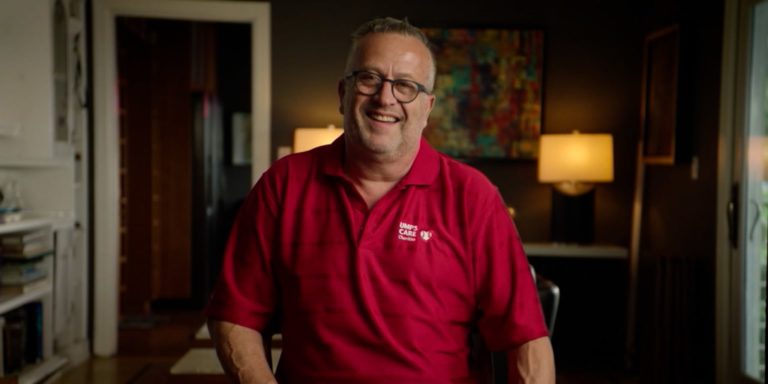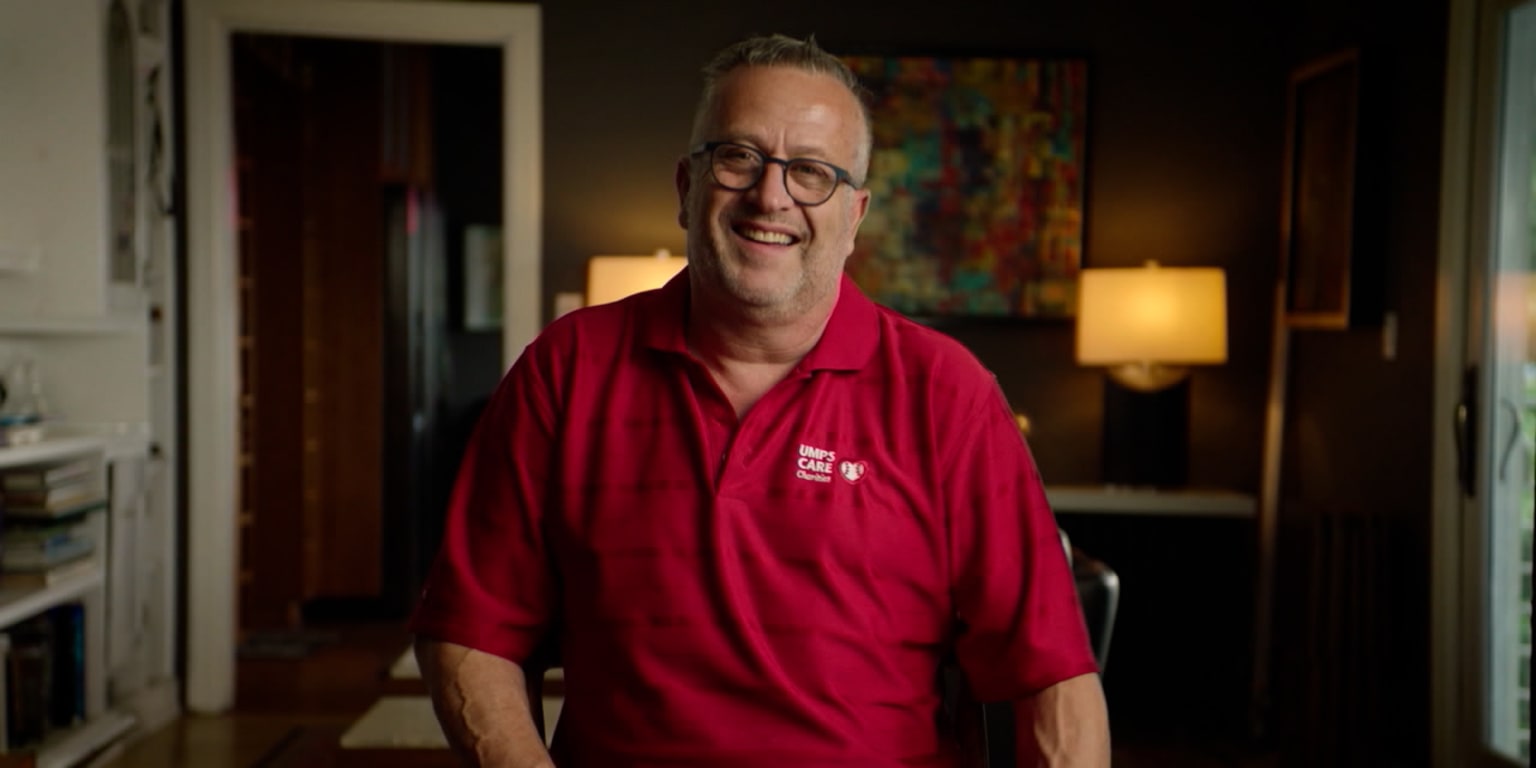

Back in 2014, Referee Magazine was getting ready to publish a remarkably detailed feature on Dale Scott. The author had tracked down several of Scott’s childhood friends, his colleagues, even his program director from his long-ago gig as an AM radio disc jockey. Readers of the subscription-only, low-circulation publication would learn everything there is to know about the life and career of this longtime Major League umpire.
Everything but his sexual identity.
So when Scott was asked to provide some photos to run with the piece, he felt torn. For here was this comprehensive, meticulous account of his personal history, and yet he had not introduced author or audience to Michael Rausch — the man who, at that point, had been his partner for nearly 20 years and his husband for one.
It didn’t sit right with Scott.
“I decided to send in a picture of him and I on flight to Australia [for the 2014 D-backs and Dodgers season opener],” Scott says now. “I sent that picture with some other ones of other things. I wrote, ‘Dale Scott and longtime companion Michael Rausch.’”
That’s the quiet, subtle way in which Scott became the first openly gay official in any of the United States’ four major male professional sports.
Scott’s decision — and the positive way it was received by the Major League Baseball industry — still resonates here in Pride Month, nearly seven years after the Referee Magazine piece was published. Scott’s experience is an example of how, even in such a traditionally conservative sport, a person can be received and judged on the quality of their work, not their sexual preference. His is a tale that will hopefully one day serve as an archetype if — and more likely when — an active Major League player has the courage to come out.
“If a guy can play,” says Scott, “I don’t think anybody cares. Evaluate me on my work on the field and nothing else. That’s what it’s all about. Straight, gay, bi or whatever. Are you a good person? Are you good in your field? Do you help the organization?”
In a career that spanned from 1986 until 2017, when concussion issues forced him into retirement, Scott proved himself an asset to the industry. He was one of the game’s most respected umps, working three World Series, three All-Star Games, six League Championship Series and 12 Division Series.
But Scott lived a double life — his life in the Majors, and his life at home in Portland, Ore.
“In baseball, I was out on the road and actively deceiving people, because I didn’t want my true self to be known,” he says. “But I certainly wasn’t in the closet at home.”
Scott’s unusual job made it possible to maintain those separate worlds. He didn’t have an office holiday party to attend with a significant other and generally didn’t have to worry about running into co-workers on the street.
Still, his secret, which he kept from all but a select few friends and family members, wore on him over the years.
Scott was just 19 years old when he looked in the mirror one day and, like any good ump, made a correct call.
“Oh, I get it!” he said to himself. “You’re gay!”
It was really that simple. Scott had felt attracted to other boys as early as the seventh grade. It was natural to him, even though he knew and understood it wouldn’t be received as naturally by everybody else. And so he made the conscious decision to, as he put it, “play the game” and keep his sexuality a secret. But he also decided he wouldn’t enter into any fraudulent relationships with women just to appease the expectations of others.
And so, for many years, Scott pretended to be the guy too busy to date. His ascension in the umpiring world gave him a built-in excuse. When his cousin, a hairstylist, would try to set him up with her clients, Scott would always decline.
“It’s so tough to have a relationship,” he’d tell her. “In another month, I’m right back on the road.”
On the flip side, when his fellow umpires would ask him about his relationship status, Scott would say things like, “Oh, I’m seeing somebody back home.”
That was true, just not in the way people assumed. Scott had met Rausch shortly after his first season as an umpire in the big leagues, and they’ve been together ever since. But Scott didn’t feel comfortable revealing his relationship to even his closest friends in the game.
Everything began to change in the late 1990s. By then, Scott had brought his “roommate Mike” along with him on enough trips that other umpires began to catch on (a good eye is a prerequisite for the job, after all). One Spring Training night, Scott was out for a drink with fellow ump Derryl Cousins, who finally broke the silence.
“Hey Scotty, I know you have a little different lifestyle,” Cousins said. “I want you to know I would walk on the field with you any time.”
With that, Scott’s complicated and carefully constructed barrier had been broken. And though Scott did not confirm anything to Cousins that night, he had been given an important window into how his revelation would eventually be received by his closest colleagues.
Changes to the umpires’ union contract in 2010 allowed Scott to add Rausch as his domestic partner for insurance purposes, and so people in the league office were aware of his sexuality several years before he came out publicly. Scott and Rausch married not long after the Supreme Court ruled in favor of same-sex marriage in 2013.
But it wasn’t until Referee published that photo that Scott was truly ready to let the world in on his secret. The magazine article was released in late September 2014.
“Crickets,” Scott says with a laugh.
As big as the moment may have been to Scott, a small caption in a publication with a circulation of about 45,000 didn’t gain much traction. But one anonymous, wily reader did spot the photo and sent it to the LGBT sports news website Outsports. And when Outsports ran a story of its own — with Scott’s participation and permission — about two months later, it had a much, much larger audience.
“For about a day and a half, it seemed like pretty big news,” Scott says. “But it wasn’t during the season, obviously, so I was curious to see what type of reaction, if any, I would be getting when the season started.”
He got his answer the following March. The Reds and Indians played a Spring Training game in Goodyear, Ariz. — Scott’s first as an openly gay umpire. He was standing near third base when, between innings, outfielder Marlon Byrd came running toward him on his way to the dugout. In what can only be described as a highly unusual player-ump interaction, Byrd wrapped Scott in a bear hug.
“You’re free, brother, you’re free!” Byrd said. “I’m so proud of you!”
Later that game, Joey Votto shook Scott’s hand and congratulated him. Elsewhere that season, Scott was saluted by one other player, one athletic trainer and one third-base coach.
That was it. Scott got supportive e-mails from all over the world when the Outsports article was published, but he never heard another word about his sexuality within baseball circles. And to Scott, that mostly unremarkable reaction was remarkable in and of itself. Because for the first time, he could do his job and live his life without fear or confusion.
“The experience I had coming out,” he says, “was very, very positive.”
Now 61 years old and conducting umpire evaluations for various camps and enjoying his retirement from the rigors of the MLB schedule, Scott will tell his story in greater detail in a forthcoming and as-yet-untitled biography, written with the help of author Rob Neyer, that will be published by the University of Nebraska Press next year.
But Scott is hopeful that a day is coming soon when stories such as his will cease to be exceptional. He observed with great interest when several active players spoke out against the homophobic slur that led to Reds broadcaster Thom Brennaman’s resignation last season, because it backs up his belief that the LGBTQ community has many more allies in Major League clubhouses today than when his umpiring career began all those years ago.
“If someone has an issue with me being gay, it’s really not my issue, it’s their issue,” he says. “I got to the point where I know and am happy with who I am. If you’re not, I guess you have to deal with that.”
Another correct call by the respected ump.